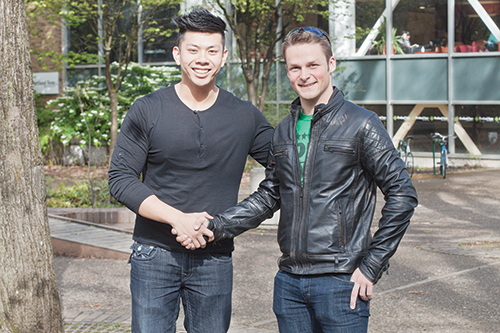Election season for the Associated Students of Portland State University, the official student government body of PSU, kicked off last week with the passing of the deadline for candidate applications. The presidential election, which will take place from April 22 to May 3, looks to be a two-person race (barring write-in candidates) between the ticket of Harris Foster and Yesenia Silva Hernandez and the ticket of James Au and Jay Phung.
Election season hits PSU

Election season for the Associated Students of Portland State University, the official student government body of PSU, kicked off last week with the passing of the deadline for candidate applications.
The presidential election, which will take place from April 22 to May 3, looks to be a two-person race (barring write-in candidates) between the ticket of Harris Foster and Yesenia Silva Hernandez and the ticket of James Au and Jay Phung.
Both tickets will also sponsor several candidates for the student fee committee and the ASPSU senate.
Foster, a junior French major, and Hernandez, a sophomore majoring in public health, are running on a three-pronged platform. They aim to amend the contract between Higher One and PSU, to implement a Good Samaritan Policy (which would allow students to call 911 for cases of drug or alcohol overdose without fear of reprisal) and, especially, to reach out to student groups and cultural centers.
The slate of Au and Phung, both seniors in the School of Business Administration, shares this goal of community outreach. In addition, they also intend to promote public safety awareness on campus.
Both candidates placed a high emphasis on meeting the needs of the PSU’s heterogeneous student body.
“We have such a diverse student population, it’s hard to target just one group,” Au said.
So far, in sharp contrast to the hostility that marked last year’s race—when accusations of rule infractions delayed the announcement of the results—the candidates this year appear to have, as Foster put it, “no bad blood.”
It is this communication that Aubrey Hoffman, the chief justice of the judicial review board, expects will lead to a smooth race despite the lack of procedural changes after last year’s debacle.
“We’re hoping that students act as responsible stewards and abide by the rules,” Hoffman said.
The JRB, which is responsible for organizing and enforcing rules for ASPSU elections, is instead focusing its efforts on increasing voter turnout, a problem that has dogged previous elections. Emily Kunkel, a senior majoring in African studies and political science and another member of the JRB, blamed the issue on a lack of information.
“A lot of people don’t know [about ASPSU’s impact], so they just don’t care,” Kunkel said.
Foster, a member of the ASPSU senate for the past 2 1/2 years, agreed that a lack of visible involvement on campus has stunted the growth of ASPSU. To combat this, he plans to meet with student groups and cultural centers while trying to introduce fresh faces with his senatorial slate, which he says is evenly split between returning senators and ordinary students.
A number of election events will be held over the course of the week, including two meet-and-greets (April 16, 5–7 p.m. in Smith Memorial Student Union, room 296, and April 24, noon–3 p.m. in SMSU 294), an SFC debate (April 19, 10–1 p.m. in SMSU 236) and a presidential debate (April 18, noon–3 p.m. in SMSU 333).







James Au: “I want to throw parties as president!” Harris Foster: “I want to fix things that need fixing.”
This is not a tough choice people.